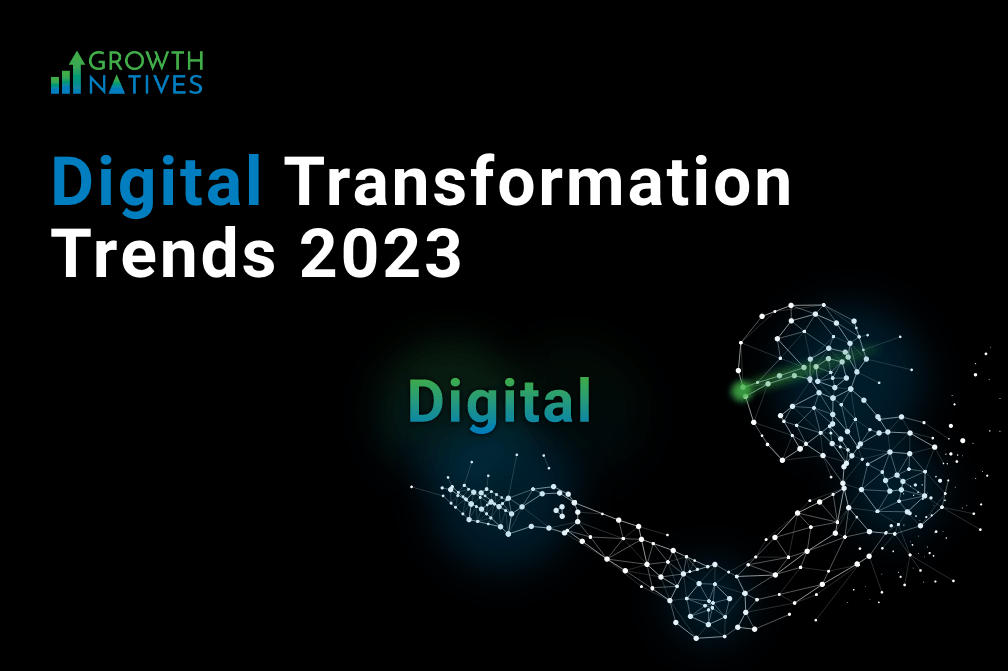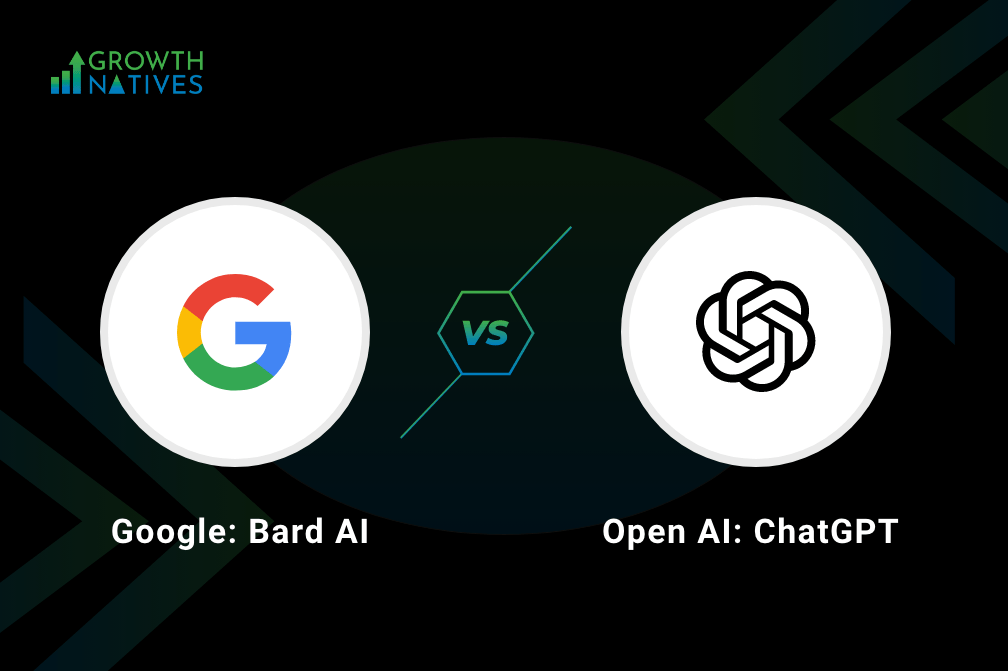Top 9 Digital Transformation Trends to Look Out for in 2023

Table of Contents
Pacing with the changing technology and customer experience can be exhausting for anyone. But it has never been more crucial to understand where digital transformation is heading when it's a key component of your organization's success.
As technology evolves and customer expectations change, the solutions that were relevant yesterday might not serve the purpose today. Thus, keeping up with the latest digital trends has become more important than ever. In this blog post, we will discuss the top nine digital transformation trends that will shape 2023 and beyond.
But before we jump any further, let’s understand what is digital transformation.
What Is Digital Transformation?
Digital transformation means the implementation of advanced technologies and unique digital experiences that will enrich business objectives, strategies, and vision while also improving customer experience.
Getting along the digital transformation journey is imperative not only to providing a better consumer experience but also surpassing consumer expectations.
The global digital transformation market was at $731.13 billion in 2022 and is expected to grow at a CAGR of 26.7% from 2023 to 2030, which makes it important for businesses to not only transform into the digital space but also revolutionize the industry. The goal of digital transformation is to integrate all of your capabilities so you can compete effectively on a large scale with your competitors.
And when it comes to digital transformation, the more you implement, the better your chances to stand out. However, transforming digitally is not possible without keeping up with the latest digital trends.
Top Digital Transformation Trends to Look Out for in 2023
1. Artificial Intelligence Is Everywhere
A study by IBM found that 42% of companies are considering using AI, and 35% are already using it. Moreover, in 2023, artificial intelligence is going to become real and ChatGPT is a small example of this – that the business world is soon going to accelerate with the presence of AI.
The businesses that have embraced the technology vouch for its ability to consistently provide innovative products and services. AI has replaced low-value repetitive labor as a means of completing high-value activities, assisting doctors, architects, and even developers in automating important tasks.
2. Shift Toward Metaverse
Experts suggest that by 2030, the metaverse will generate up to $5 trillion. Augmented reality (AR) and virtual reality (VR) have already become important parts of virtual training and onboarding in many companies. And in 2023, developments and acceleration in the use of this technology will be seen.
The use of metaverse in the business world results in a more immersive work environment that will help to increase productivity and brainstorm new ideas. Another innovative feature to look out for is advanced avatar technology, which will look exactly like the real world, and with avant-garde features like motion capture it will progressively embrace human body language and gestures.
3. High Focus on Cybersecurity
It's critical to think about security concerns as firms expand their use of available technology infrastructures and rely more heavily on the cloud. The exponential growth of organizational operations using the cloud creates the potential for cybersecurity risks and outages.
Moreover, it is anticipated that by 2030, the cybercrime rate cybercrime would reach $8 trillion a year. Enterprises profit from innovative solutions, but complex and persistent cybersecurity dangers have also emerged. To secure sensitive consumer information, personnel records, and corporate data, businesses must adopt proactive cybersecurity practices.
4. More Investment in Blockchain
As an embryonic technology, blockchain has a potential has the potential to upend standard business practices by forming smart conventions and keeping permanent records. Statista report suggests that global spending on blockchain solutions will reach $19 billion by 2024.
Globally, there are more than a thousand blockchains. This technology is also recognized as a key component when we talk about digital transformation trends to look for in the coming years. And since software vendors want a more secure environment to avoid critical information from being exposed to the public, blockchain is regarded as the best solution.
5. More Personalized Experiences
Over time, there has been considerable evolution in the consumer experience. Delivering personalization at the foundational level requires using digital transformation to develop innovation and drive consumer experiences. According to 69% of consumers, regaining customer trust depends on offering personal experiences they appreciate.
Businesses must leverage technology to create sophisticated and successful customer experiences. Businesses can also develop unique and satisfactory experiences by utilizing data and analytics that go beyond automated chatbots and take into account customers' wants, behaviors, and objectives.
6. Increased Reliance upon Low Code Tools
Due to the advantages low code/no code platforms provide in terms of time, money, scalability, and risk reduction, their adoption has gained importance in recent years. Moreover, it is anticipated that by 2030 low-code development tools will generate around $187 billion.
In the upcoming years, the low-code market is anticipated to expand quickly. The use of low code will eventually not only enhance but will eventually replace the use of multiple code-driven programs. It will offer a platform for IT teams and large enterprises to work together on the development of applications.
7. Growth in Multi-Cloud Architecture
Essentially, the requirement to ensure business continuity during the COVID-19 pandemic led to the widespread use of multi-cloud architectures. Over half of the world has slowly moved towards multi-cloud architecture. Gartner's report predicts that the global public cloud investment will reach $591.8 billion in 2023.
The greatest alternative for businesses searching for more cost-effective, dependable, and efficient services across numerous platforms is a multi-cloud solution. Businesses must thus look for cloud computing and automation solutions in order to manage their numerous cloud environments.
8. Expansion in Customer Data Platforms
The global customer data platform (CDP) market is expected to grow $6.94 billion by 2029, exhibiting 25.4% growth from 2022. All customer data is combined into a single view via the customer data platform, which establishes real-time profiling to link the data to the individual. With this, more information on customers is available to businesses than ever before.
Decision-makers can readily examine the data and take immediate action to encourage conversions. The ability to fully comprehend the consumer is made possible by CDPs. Moreover, the use of customer data platforms is effective in enabling excellent customer experiences.
9. More Reliance Toward Automation
Data transformation and automation co-exist. By automating organizational operations, businesses will accelerate the rate of digital change within their enterprises. Gartner predicted, companies will be able to reduce operating expenses by 30% by 2024 with hyper-automation.
Automation solutions help firms speed up the execution of internal operations by reducing the need for manual execution. The best way to speed up automation is by selecting the right business automation solutions that will help deliver faster and better results.
Conclusion
The world is transforming, thanks to the use of digital strategies and innovative digital trends. No matter what trend you see in the coming years, the goal is to see how well these trends will align with your business space and objective. If you are planning to start your digital transformation journey or looking for guidance on the upcoming digital trends, Growth Natives can help you along the road by implementing digital transformations to help your business succeed. Reach out to us today!
Author Box
Sakshi Arora
Sakshi Arora is a seasoned content writer and editor with extensive experience across various industries including B2C, B2B, travel, e-commerce, and IT. In her free time, she enjoys expressing her creative side through painting and writing poetry. She also finds solace in nature and has a deep spiritual connection. Music brings her immense joy.




